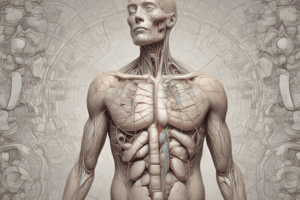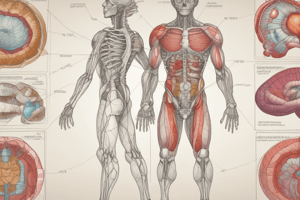Podcast
Questions and Answers
What is the main difference between peptide hormones and steroid hormones?
What is the main difference between peptide hormones and steroid hormones?
- The source from which they are derived
- The organs they target
- The type of receptors they bind to
- How fast they make changes in the cell and how long those changes last (correct)
What happens when a hormone attaches to its specific receptor?
What happens when a hormone attaches to its specific receptor?
- It inactivates the enzyme
- It releases a new hormone
- It changes the shape of the protein (correct)
- It changes the shape of the hormone
What is the primary function of peptide hormones?
What is the primary function of peptide hormones?
- To synthesize new proteins
- To activate existing enzymes (correct)
- To secrete hormones into the bloodstream
- To inhibit existing enzymes
What determines the specificity of a hormone to its target organ?
What determines the specificity of a hormone to its target organ?
What is the characteristic of steroid hormones that allows them to change what the cell is making?
What is the characteristic of steroid hormones that allows them to change what the cell is making?
What is the advantage of steroid hormones over peptide hormones?
What is the advantage of steroid hormones over peptide hormones?
What is a characteristic of exocrine glands?
What is a characteristic of exocrine glands?
What is the purpose of the lock-and-key mechanism in hormone action?
What is the purpose of the lock-and-key mechanism in hormone action?
What is the primary function of the endocrine system?
What is the primary function of the endocrine system?
What is the name of the chemical messengers produced by the endocrine glands?
What is the name of the chemical messengers produced by the endocrine glands?
Where do hormones dissolve into the bloodstream?
Where do hormones dissolve into the bloodstream?
What is the term for the process by which hormones travel to their target cells?
What is the term for the process by which hormones travel to their target cells?
What is an essential characteristic of a hormone?
What is an essential characteristic of a hormone?
What is the role of the endocrine organ in hormone production?
What is the role of the endocrine organ in hormone production?
How does a hormone interact with its target cell?
How does a hormone interact with its target cell?
What is the function of cell projections in hormone interaction?
What is the function of cell projections in hormone interaction?
Flashcards are hidden until you start studying
Study Notes
Anatomy of the Endocrine System
- The endocrine system is composed of glands that regulate various body functions, including reaction to the environment, blood substance levels, metabolism, growth, immune responses, and sexual development and function.
Hormones
- Hormones are organic chemicals produced by one set of cells that have an effect on a different set of cells.
- Hormones have a specific organ of origin, target organ, and specific action.
- Hormones dissolve into blood plasma and travel to specific body regions through the bloodstream to reach their target cells.
- It takes time for a hormone to be produced, released into the bloodstream, circulate, and eventually reach its target cell.
Lock and Key Mechanism
- Hormones interact with their intended target cells through a lock and key mechanism, where each hormone fits into a very specific receptor on the cell surface.
- If the hormone does not fit the receptor, it cannot attach to the cell.
Classes of Hormones
- There are two major classes of hormones: peptide hormones and steroid hormones.
- Peptide hormones are derived from proteins (peptides and catecholamines) and attach to the outside of the cell, activating existing enzymes for quick action.
- Steroid hormones are derived from cholesterol, pass through the plasma membrane, and alter protein synthesis for slower but longer-lasting action.
Types of Glands
- There are two main types of glands in the body: endocrine glands and exocrine glands.
- Endocrine glands secrete hormones directly into the bloodstream.
- Exocrine glands, found in the digestive system, have ducts and secrete into an epithelial surface.
Studying That Suits You
Use AI to generate personalized quizzes and flashcards to suit your learning preferences.




